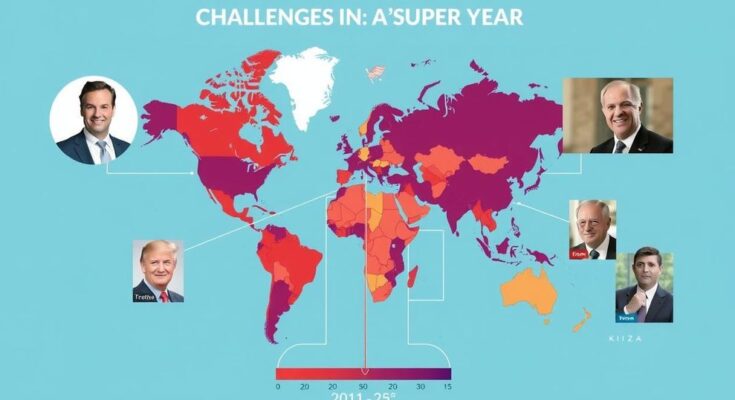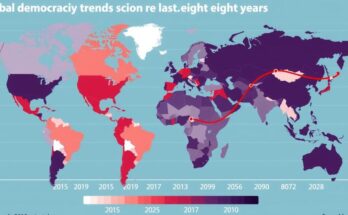In 2024, global voters expressed widespread dissatisfaction with incumbent governments, leading to significant election upsets in numerous countries. Economic struggles, largely stemming from pandemic effects and geopolitical tensions, motivated much of the discontent. Political volatility ensued, with rising authoritarianism, challenges of foreign meddling, and the emergence of new political players. This phenomenon likely signals turbulent times ahead for democratic governance.
In 2024, global elections revealed a significant anti-incumbent sentiment as voters expressed frustration with existing governments. Roughly 70 nations, representing half the world’s population, participated, and many incumbents faced dismissal. Trends showed a preference for outsiders, as illustrated by dramatic election losses in countries like India, South Africa, and the United Kingdom, reflecting widespread discontent over economic turmoil and political instability. Political scientists attribute this to the lingering effects of the COVID-19 pandemic and rising inflation, exacerbated by ongoing conflicts.
Incumbent parties faced major defeats in numerous countries. In South Africa, the African National Congress was forced into coalition due to a significant loss. Similarly, in India, Prime Minister Narendra Modi’s party fell from power amid rising opposition. The political landscape in Japan was drastically altered following a significant blow to long-standing political dominance, and the United Kingdom saw a shift in power dynamics with the rise of smaller parties.
Moreover, a trend toward authoritarianism emerged as right-leaning parties gained traction across Europe, with notable victories in parliamentary elections in France and Austria. Despite the setbacks for incumbents, and ongoing global unrest, a number of countries continued to experience political maneuvering steeped in nepotism, such as the election of Shehbaz Sharif in Pakistan, showcasing the complex interplay of established political families.
Concerns surrounding election integrity and foreign interference also surfaced, highlighted by Meta’s removal of numerous deceptive operations linked to Russian disinformation efforts. This backdrop illustrates a precarious global democratic climate, with nations like Romania and Georgia grappling with allegations of electoral rigging.
The year concluded with uncertainty and dangers of political unrest, exemplified by significant events in countries like Venezuela and Mozambique, which endured intense protests and governance challenges. As 2025 approaches, countries like Germany and Canada prepare for significant elections, indicating that the turbulence in global democracy is poised to persist.
The elections of 2024 across the globe produced sweeping changes in political leadership, characterized by voter discontent primarily driven by economic hardship and social instability stemming from the COVID-19 pandemic and geopolitical tensions. The phenomenon of rising populism and far-right movements surged as incumbents in various democracies faced rejection from an electorate weary of prolonged crises and demanding change. Critical events including mass protests, electoral annulments, and shifts toward authoritarian governance have painted a complex picture of contemporary democratic resilience and fragility. Moreover, escalating fears of foreign interference have cast doubt on the integrity of electoral processes worldwide, further complicating the political landscape.
The 2024 global elections showcased a powerful voter sentiment against incumbents amidst rising economic and social instability. The landscape revealed significant political volatility, with many countries experiencing regime changes and challenges to democratic principles. With authoritarian tendencies gaining ground and alarm over foreign interference manifesting, the state of democracy appears precarious moving forward into 2025, suggesting that the quest for stable governance remains fraught with difficulties.
Original Source: www.news4jax.com




